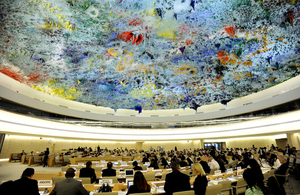Human Rights Council 37: Joint Statement on Human Rights situation in the Maldives
This Joint Statement was delivered at the 37th Session of the Human Rights Council on behalf of over 40 countries during the discussion under Item 2, held on 8 March 2018.

The Human Rights Council takes place at the Palais des Nations in Geneva
This statement (as of 8 March) was supported by: Albania, Austria, Australia, Belgium, Bulgaria, Canada, Croatia, Cyprus, Czech Republic, Denmark, Estonia, Finland, France, Germany, Georgia, Greece, Hungary, Iceland, Ireland, Italy, Latvia, Lichtenstein, Lithuania, Luxembourg, Macedonia, Malta, Montenegro, the Netherlands, New Zealand, Norway, Poland, Portugal, Romania, Slovenia, Slovakia, Spain, Sweden, Switzerland, Ukraine, the United Kingdom and the United States
I am making this statement on behalf of over 40 countries in response to the serious human rights concerns you have raised with regard to the Maldives in recent public statements.
At the June 2017 session of the Council, 34 states supported a statement on the Maldives that underlined the importance of allowing activities by opposition parties and political leaders, and space for the expression of diverse political views. The statement stressed the need to respect the rights of peaceful assembly and freedom of expression, the importance of independence of the judiciary and emphasised the need to uphold constitutional guarantees for human rights.
It is therefore of grave concern that in recent weeks the human rights situation has further deteriorated significantly; a situation you described on 7 February as ‘an all-out assault on democracy’. Under the state of emergency declared and prolonged by President Yameen a large number of human rights and fundamental freedoms enshrined in the Constitution were suspended, including rights of peaceful assembly, privacy, and freedom from unlawful arrest and detention. Members of the Supreme Court have been arrested and imprisoned since 5 February, and the independence of the judiciary more broadly has been curtailed, with its decisions reversed. Members of Parliament have also been arrested, inhibiting Parliament’s independent functioning. Detentions and intimidation of political opponents, journalists, civil society activists and human right defenders, which were all already occurring before the state of emergency was declared, have continued.
Many at this Council talk about the need for this body to play a greater role in preventing serious human rights violations and to provide an early warning function. We strongly support this. With this in mind it is therefore deeply regrettable that the Government of Maldives has not chosen to engage constructively with this body and its mechanisms. Instead, its response has been to ignore expressions of legitimate concerns and to further restrict human rights and fundamental freedoms in contravention of its domestic and international obligations. We call on the Government of Maldives: to address immediately the deteriorating human rights situation in the country; to end peacefully the state of emergency; to restore all articles of the Constitution; to allow the Supreme Court and other branches of the judiciary to operate in full independence; to permit and support the full, free and proper functioning of Parliament, with the reinstatement of twelve members of the Parliament as ordered by the Supreme Court, and to free political prisoners and their family members.
We welcome the ongoing attention given to the situation in the Maldives by you, High Commissioner, and urge the Government of Maldives to engage with you and your Office, as well as the mechanisms of the Council in order to address this extremely worrying situation.